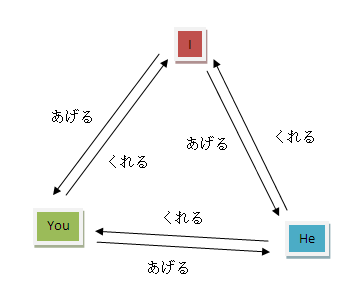Just to avoid repeatedly saying いただきました too much, can I occasionally switch it with 下さりました or 下さいました?
2 Answers
いただきました is past tense of いただく, which is a polite version of もらう, which means 'to receive'.
下さいました is past tense of 下さる, which is a polite version of くれる, which means 'to give'.
They are different words but can be used in the same context as long as you correctly assign who is the giver and who is the receiver. But do take note that the emphasis of the sentence and the particles used may change if use one over the other. Example:
これは先生からいただきました。
This was received from Teacher.これは先生がくださいました。
Teacher gave (me) this.
Note: In general, くれる is only used when the giver is the third person (neither the speaker nor the person he/she is speaking to) or if the giver is second person and the receiver is first person. If the giver is first or second person, あげる should be used. Or another way to see it, くれる is used when the giver is out-group, and あげる is used if the giver is in-group. Maybe it's easier to see from a diagram:

Note: the receiver always uses もらう or its variants.
-
これは先生からいただきました is correct but you could use also これを先生からいただきました (and interchange から with に)– repecmpsCommented Jun 2, 2011 at 10:53
-
"[...] くれる is only used when the giver is the third person [...]" This doesn't sound right, as I can directly thank someone for doing a favor for me, such as with 先日、手伝ってくれてありがとう。 (The diagram you supplied confirms this is valid.) Could you clarify? Commented Jun 2, 2011 at 12:41
-
@Derek that sentence of mine has a second part after the 'or' :)– LukmanCommented Jun 2, 2011 at 13:15
-
1I think it's easier to use ingroup vs outgroup to choose between kureru and ageru, if you have the grasp on those concepts– LukmanCommented Jun 2, 2011 at 13:19
-
Ah, you're absolutely right. I apologize for not reading as closely as I should have been. Commented Jun 2, 2011 at 13:37
Lukman already gave a nice answer, but let me add some comments in the context of the question.
The question is about ~ていただきました and ~てくださいました, two different methods of making 敬語 out of other verbs. While strictly speaking Lukman’s answer focuses on the basic use of いただきました and くださいました as receiving and giving physical items, the same explanation also applies to ~ていただきました and ~てくださいました. In short, they are not interchangeable unless you change the other part of the sentence suitably.
For example, a master of ceremony can introduce a speaker before a speech as “Today we have Prof. Tanaka from Kyoto University (as a speaker)”:
- (correct and appropriate) [今日]{きょう}は[京都大学]{きょうとだいがく}の[田中先生]{たなかせんせい}に[来]{き}ていただきました。
- (incorrect) [今日]{きょう}は[京都大学]{きょうとだいがく}の[田中先生]{たなかせんせい}に[来]{き}てくださいました。
- (correct, but see below) [今日]{きょう}は[京都大学]{きょうとだいがく}の[田中先生]{たなかせんせい}が[来]{き}てくださいました。
The first sentence does not have a subject, but the implicit subject would be someone who “received” the visit, in other words, “us.” The second sentence is incorrect. The third sentence has subject 田中先生 and is correct.
However, as a separate issue, some people may find the third sentence not appropriate, because it is usually more polite to avoid using a person to be respected as a grammatical subject of a sentence.
-
Very good examples, will upvote tomorrow since I have run out of vote for today. And one question, if MC and 田中先生 are 知人/同僚, he may use third one, right?– YOUCommented Jun 2, 2011 at 16:28
-
@YOU: Thanks. Possibly, but it is hard for me to answer definitely, because (1) the difference between sentences 1 and 3 are subtle, (2) if they are so close friends that the MC does not use the sentence 3, then the MC will probably just say something like 今日は京都大学の田中先生が来ています, and (3) I am not a grammarian and I do not have any grammar book of Japanese within my reach (ugh). @repecmps: Thanks. Commented Jun 2, 2011 at 16:37
-
@Tsuyoshi Ito, Thanks for those points. That's still make sense, and no problem, I am not serious, but just want to confirm, my understanding is not wrong.– YOUCommented Jun 2, 2011 at 16:43
-
Just in case, in my previous comment, “if they are so close friends that the MC does not use the sentence 3” should read “… the sentence 1.” Commented Jun 2, 2011 at 16:50
-
Oh yeah, using "来ていただきました" to close friends would looks like strangers.– YOUCommented Jun 2, 2011 at 16:53
